Sharon Beharrie says doing an MBA has boosted her confidence. She left her job as a programme manager at a business school and started her own company.
Know the ‘why’ before you take the MBA leap
Undertaking an MBA is a major commitment that requires time, money and dedication. Stephnie Atkinson and Sharon Beharrie agree that before embarking on this highly competitive programme, prospective students should examine why they want to pursue this route and what they hope to achieve. They say that having a clear idea of what they were working towards helped them stay on track during their studies.
Atkinson recalls her first taste of real on-the-job mentorship when she joined Caxton in a sales position after years in the workforce: “This inspired me to grow my career, but I did not know what the next step was or how to take it. I felt like I had hit a ceiling.”
Beharrie was also established in her career, but she left her job as a programme manager at a business school to start her own company. “I wanted a formal qualification to give me the necessary theory that I could apply practically in my new business,” she explains.
Motivation for academic success
Enrolling for an MBA was not a decision that Beharrie took lightly, having worked closely on the programme in her previous job: “I knew how tough it was, and also knew that personal motivation got people through it at the end of the day. You must know your why!”
Atkinson had never considered enrolling in a business programme. “Pursuing an MBA always seemed out of reach due to financial and time constraints,” she recalls. This changed in 2018 when, while researching a client in the education industry, she started getting targeted ads for MBAs. Despite initial reservations, she applied and was accepted into an online MBA programme in 2019. She even received a partial bursary to help finance her studies.
“The biggest ‘yes’ moment for me was the realisation that this was my chance to break through my own ceiling and finally get myself out of this job rut,” she says.
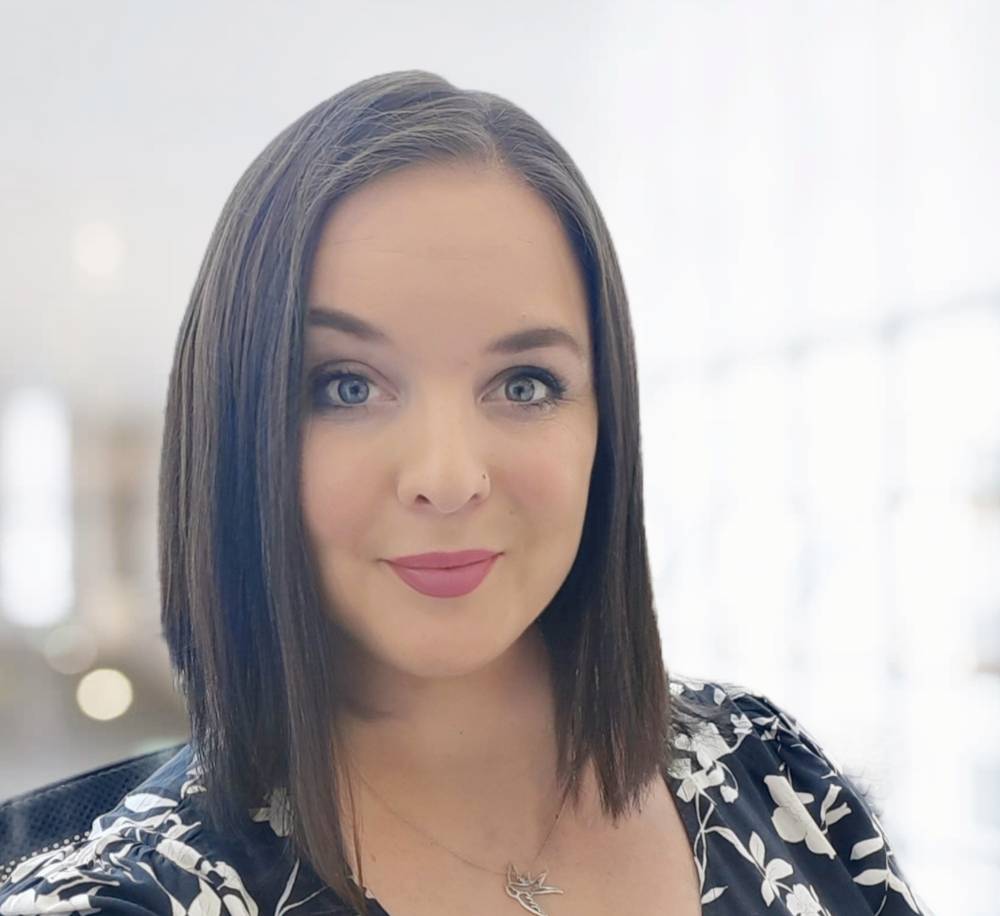 Pursuing her studies has opened doors for Stephnie Atkinson – it’s enabled her to break through her own ceiling and climb out of her old job rut.
Pursuing her studies has opened doors for Stephnie Atkinson – it’s enabled her to break through her own ceiling and climb out of her old job rut.
She knew that the programme was gruelling and the selection process highly competitive. The bursary was also a once-in-a-lifetime opportunity, but the birth of her child and the arrival of Covid-19 meant she started her studies a year later than planned.
Reaping the rewards
Atkinson’s investment has already paid dividends. “My MBA opened doors and connected me to networks and opportunities, both while studying and since graduating.” She says her career no longer feels confining or stalled. “The programme was a fantastic experience and I gained knowledge and confidence in business strategy, leadership and management.”
Beharrie agrees that the qualification equipped her with critical skills and vital knowledge and boosted her confidence in her own abilities. “The MBA has given me the theoretical framework to support my personal instincts,” she says.
Both women acknowledge the journey is not easy and some self-doubt is natural when making a big career change. This is why they also advocate for fostering strong support systems when deciding to pursue a mid-career qualification.
External support is crucial, but Beharrie adds introspection and a commitment to self-improvement remain important: “Do the hard work. Know your boundaries. Work on yourself. Get a sponsor, a mentor, a coach … and a go-to person whom you can be completely honest with, who will call you out while still being in your corner.”
According to Atkinson, it was her most challenging undertaking to date, but “still one of the best decisions I have ever made for myself and my career”.
Both Atkinson and Baherrie view their investment in an MBA as an investment in themselves and their future. Atkinson is now a senior project manager at Jellyfish, a global advertising firm, while Baherrie is Senior Manager of Learning and Leadership Development at the MultiChoice Group. Having a clear understanding of the “why” enabled both women to take the risk … and reap the rewards. — Jane Roberts
Mastering the startup ecosystem
Startup founders — especially those in technical and engineering fields — possess innovative, solution-focused ideas but often lack the business acumen to bring them to fruition. This is something that Steve Vey discovered first-hand when, as a scientist, he found himself out of his depth when it came to the business side of operations.
After completing a BSc in Chemical and Polymer Science and putting his qualifications to use in the mining industry, Vey joined a startup specialising in drone technologies. He found himself increasingly frustrated by the fact that, despite having scientific expertise, he lacked the business know-how to support himself and his projects.
Unless underpinned by a solid business foundation, he realised, the impact of innovation remains limited: “I had no background in business, but the startup sector helped me develop a passion for it. I wanted to understand how things worked to improve processes.”
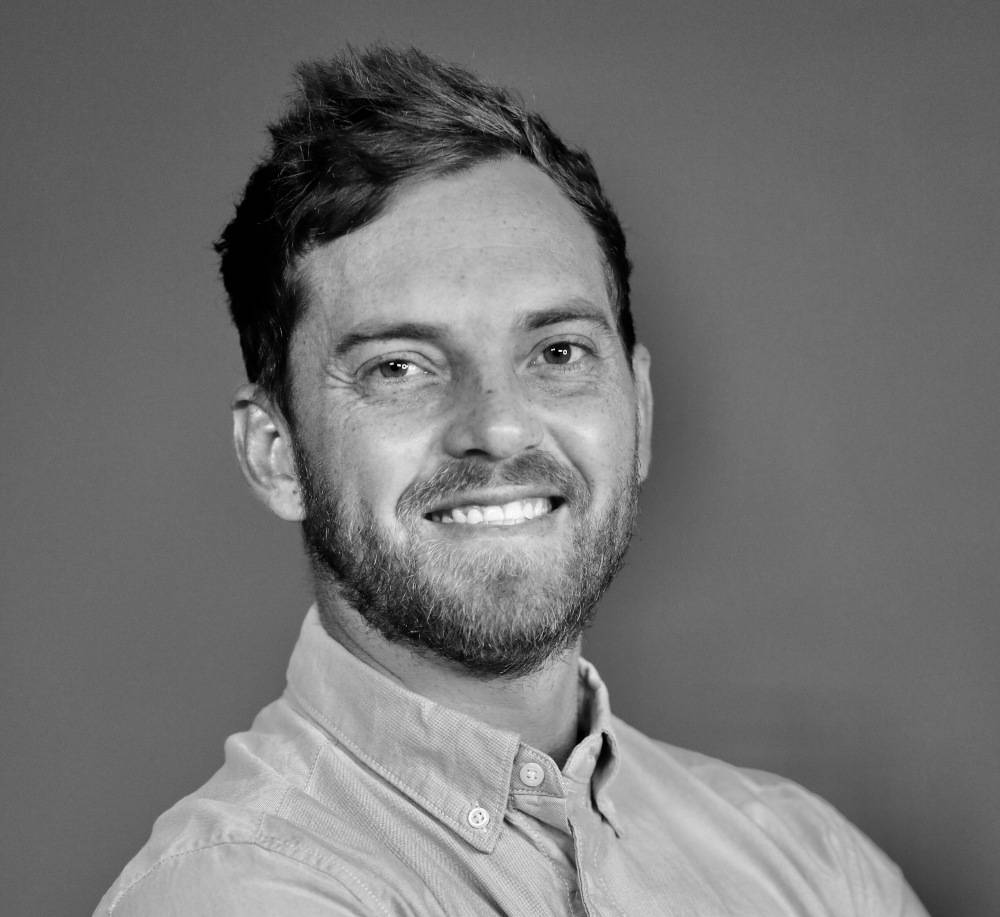
Steve Vey thrives on empowering startups, using his solid business foundation.
It was this thirst for knowledge and appetite for improvement that inspired him to pursue a postgraduate degree in Business Management and Administration (BMA) at Stellenbosch University. This qualification, he explains, counted for credits towards his Master of Business Administration (MBA) and created a smoother transition into the programme.
Supporting potential and fuelling growth
As a current MBA student, Vey says his studies and newfound knowledge have already elevated his career and helped him gain entry into the field of venture capital as an entrepreneur-in-residence with Savant Venture Fund. “Here, we invest in home-grown science and engineering hardware to solve global problems through local innovation,” he explains. His job is to assist with the screening and evaluation of investment opportunities.
Having a firm understanding of the business principles is crucial when supporting these startups to reach their full potential. “The knowledge and skills are valuable, because I’m able to critically assess companies and identify areas for improvement,” he says. “I thrive on the fast-paced and ever-evolving nature of startups and find it rewarding to assist them to overcome challenges, refine their strategies and scale their operations.”
Business development, market research and strategy skills critical for startups
Startups need a firm understanding of their potential markets in order to develop as businesses and plan strategically for success. “My aim is to empower startups that disrupt industries, create innovative solutions and make a lasting impact on the market,” he says. “Being part of the founders’ journey towards success within the startup ecosystem is not only incredibly rewarding; it is also a constant source of motivation for me to make a meaningful contribution and drive positive change.”
Vey believes the multifaceted skill set he acquires through his MBA provides business insights that can guide founders, while his science expertise means he is able to offer an informed perspective when reviewing the technical aspects of projects.
Startups and MBAs: Challenging but possible
Vey hopes to complete his studies in 2024. “I knew I wanted to get my MBA and figured it would be better to do before having kids,” he says. “In terms of the workload, it helps to just do an hour or two of studying each day to minimise the overwhelm.”
He says the startup space is also an excellent environment to put the knowledge from the classroom to the test in real-world scenarios.“There are fewer corporate hurdles to navigate, and having business expertise is more practical and applicable than elsewhere.”
In this way, Vey says he is able to apply his learnings in real time, and, while doing so, help businesses grow along the way. — Jane Roberts
Adaptable communication in the face of uncertainty
In today’s globally connected world, clear communication is incredibly important, as more and more professionals find themselves working across borders — whether those borders are corporate, industry-related, linguistic, geographic, cultural or societal. Whether switching business functions, countries or career tracks entirely, the ability to make meaningful connections with diverse audiences becomes critical, and success is increasingly reliant on adaptable communication approaches based upon listening.
Niall Wilkins is Head of Communication and Digital Marketing Sub Saharan Africa for Kemin Industries, a global biotechnology company. His career has been multifaceted — spanning sectors and industries and including government, diplomacy and corporations — and exemplifies this need for versatility and resilience.
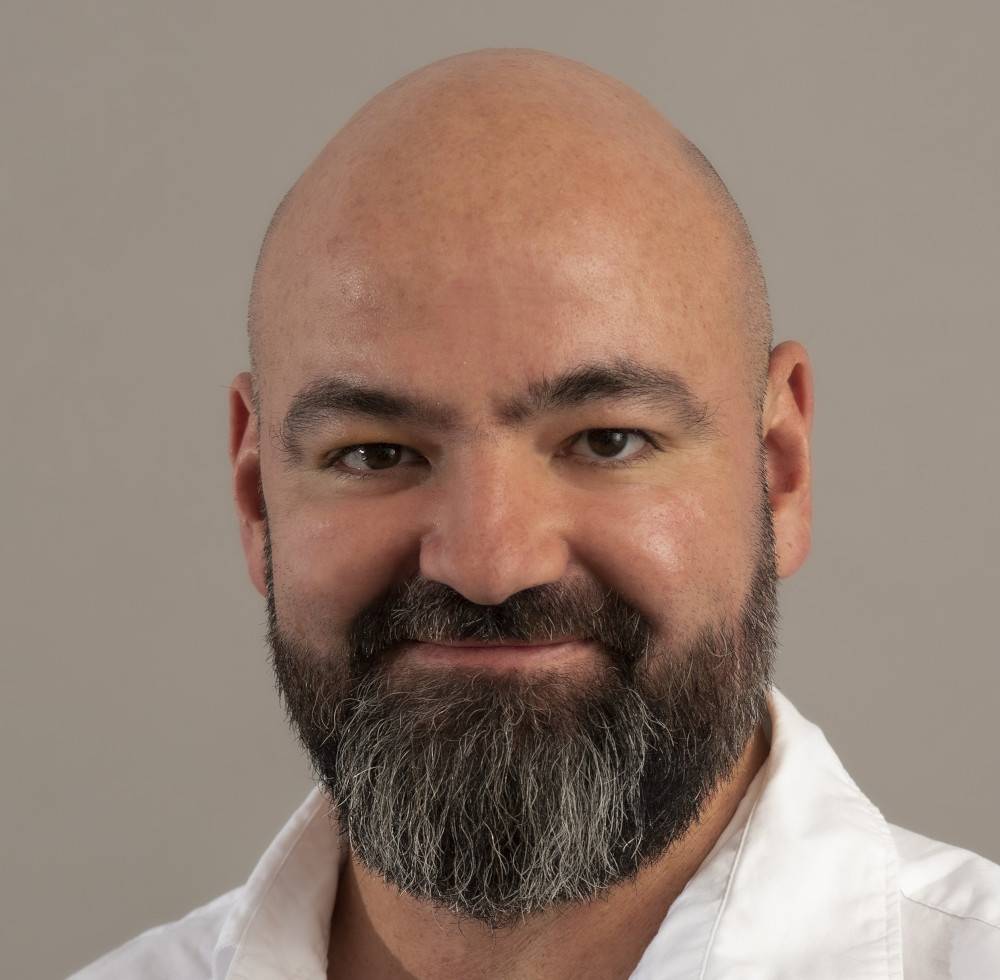
MBA has taught him the value of listening – using the knowledge of its members will move a whole team forward.
Wilkens credits his studies in politics, philosophy, and economics with instilling valuable perspective-taking skills. He says his first degree, which was in philosophy, enabled him to engage with logical arguments and different perspectives. It also taught him to be flexible when faced with situations that challenge his existing beliefs, convictions and accepted structures.
Embedding confidence
During his career in public diplomacy, Wilkins had amazing experiences while living abroad and fostering diplomatic relationships with other African countries. After ten years of working in government, however, Wilkins shifted his attention to the private sector. To prepare for this change, he decided to pursue an MBA degree, which he hoped would aid him in reaching his new career aspirations.
This, he said, did wonders for his self-esteem: “The qualification and the time spent studying instilled a sense of confidence that wasn’t there before. To me, this degree offered a ‘seat at the table’ of corporate South Africa, in essence proving to myself that I had what it took and could hold my own as I made the move from government to the private sector.”
His newfound knowledge and skills were not the only benefit; he also gained a network while on the course that he still draws on for support today.
Learning to listen and work in diverse spaces
The MBA provided Wilkins with a different frame of reference to his previous studies. It also taught the communications professional how to better deal with diversity, both in the workplace and in life. “The MBA helped me understand that there will often be varying opinions on what the correct course of action should be, but it also taught me the value of listening,” he says.
“Every single person you meet and work with knows something — often infinitely more than you do — and it’s important to take this into consideration while still reaching a decision that moves the team forward,” he explains. “It can’t be ‘my way or nothing’, and reaching this understanding has been invaluable.”
Becoming flexible
Wilkins says his MBA provided a solid foundation in areas such as financial analysis, business and marketing strategy, persuasion, influence and decision-making. But, he emphasises, no qualification on its own is enough to fully future-proof leaders and their careers: “If anything, the past five years have made that clear! Two immediate examples are the pandemic and, more recently, the advent of Artificial Intelligence.”
His MBA, however, did teach him to be flexible. “I believe the programme creates fertile ground for new ideas and learnings, which means graduates are less resistant to change and better able to adapt to the new environments while building on previous experience and knowledge,” he says.
According to Wilkens, when coupled with his other studies, the MBA “created new paradigms through which I view the world”. It allowed him to craft communications tailored to business goals and audiences and equipped him with skills like persuasion, influence and decision-making, which are particularly valuable when negotiating competing perspectives.
Better-crafted communications
Throughout his career, Wilken has had to synthesise and convey complex topics to diverse stakeholders. He credits his MBA with building confidence to communicate corporate interests coherently across functions. Wilken is now able to “articulate issues to a wider audience externally” — especially after adding a digital marketing diploma to his resumé.
He has also applied MBA teachings to relationship-building. He notes the importance of “listening to understand” and adds that this empathetic approach enables meaningful exchange.
Wilken believes communicators must remain adaptable and versatile because while “variances in businesses exist, myriad similarities resound universally”. Adaptability is key to resonating across borders, whatever those borders may be.
Every professional should develop the confidence, networks, leadership, flexibility and capacity for great communication, and the MBA remains a good way to explore new ways of thinking and cementing these critical skills. With an open and curious mindset, communicators can gain the versatility to make meaningful connections — even in our uncertain future.
Nurturing creative entrepreneurs
South Africa’s creative economy is on the rise, creating a specific demand for professionals who are able to bridge the gap between artistic innovation and sustainable business practices. For those select few with skill sets that incorporate both the corporate and the creative, a niche exists. This is a space where an enticing blend of artistic ingenuity and pioneering acumen is taking root, reshaping the very essence of creative entrepreneurship.
South Africa’s creative economy is a hotbed of innovation and growth, contributing significantly to the nation’s job creation and economic recovery plans. This industry contributes around R90 billion to the national economy and accounts for 6% of all jobs in South Africa — around one million jobs, according to a 2022 report by the South African Cultural Observatory.
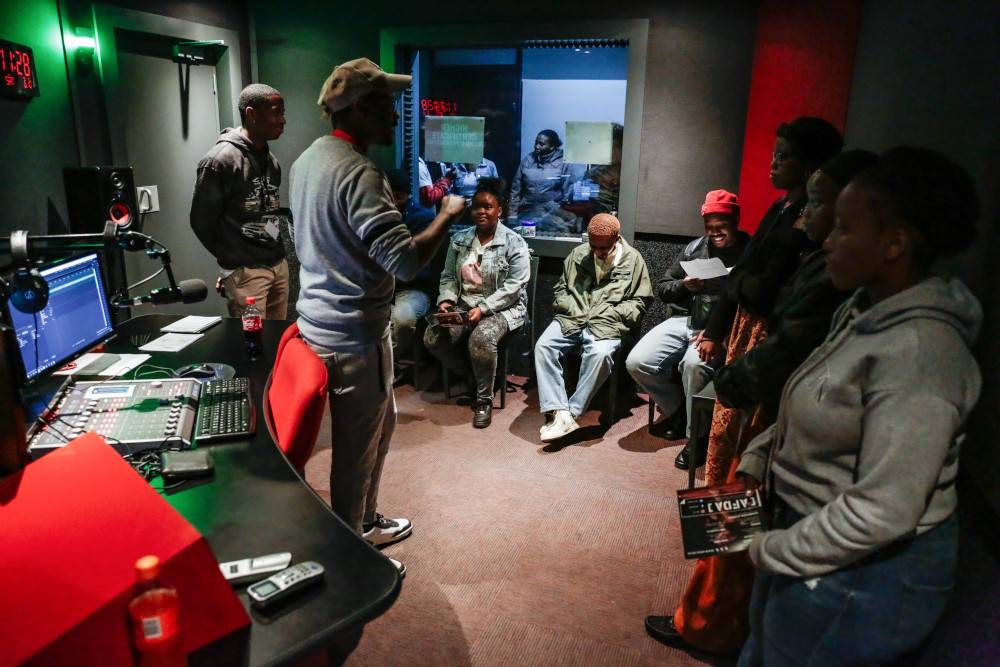
At AFDA, students are encouraged to work in groups to find creative solutions.
Against this backdrop of burgeoning opportunity, the South African School for Motion Picture Medium and Live Performance, or AFDA, has stepped in to bridge the gap between artistic passion and economic success. Now offering a BCom Postgraduate Diploma in Innovation, the institution enables students to actively contribute, collaborate and create the industry they want.
François Smit, AFDA’s Head of Postgraduate Studies, says the curriculum is focussed on practice-led learning that equips students with a unique skill set that melds artistic talent with a deep understanding of the business side of the creative industries. “For 30 years, we have facilitated the curiosity and learning goals of students, but the agency, context and passion comes from them,” Smit explains, adding that this practical and student-centred approach is what sets the institution apart. “Our programmes are aligned to their needs.”
The postgraduate innovation programme has been developed in close collaboration with industry professionals, ensuring that graduates are not only creatively competent but also equipped with the skills required by the job market. AFDA also boasts a three-decade strong alumni network, many of whom are still actively involved in various programmes at the institution.
This is crucial in ensuring that the postgraduate offerings are on par with industry trends and reflective of local and global best practice. This extensive network of industry connections, which include partnerships with prominent production companies, theatres, and creative agencies, provide students with opportunities for internships, mentorship and real-world experience.
Smit says when it comes to theory, AFDA is well-placed within academia and draws on that academic citizenship and context to give students a holistic picture of the industry. “The faculty is focussed on igniting and fostering students’ professional curiosity and guides them to find answers and engage with creative ways to solve problems.”
These skills are furthered through collaboration, Smit explains: “We cannot deny the importance of the cohort. Students are encouraged to work in groups and often learn more from each other than they would in the classroom alone. We see them grow from their group interactions and learn the 21st-century skills so desperately needed for survival in the ‘post-post’ world together.”
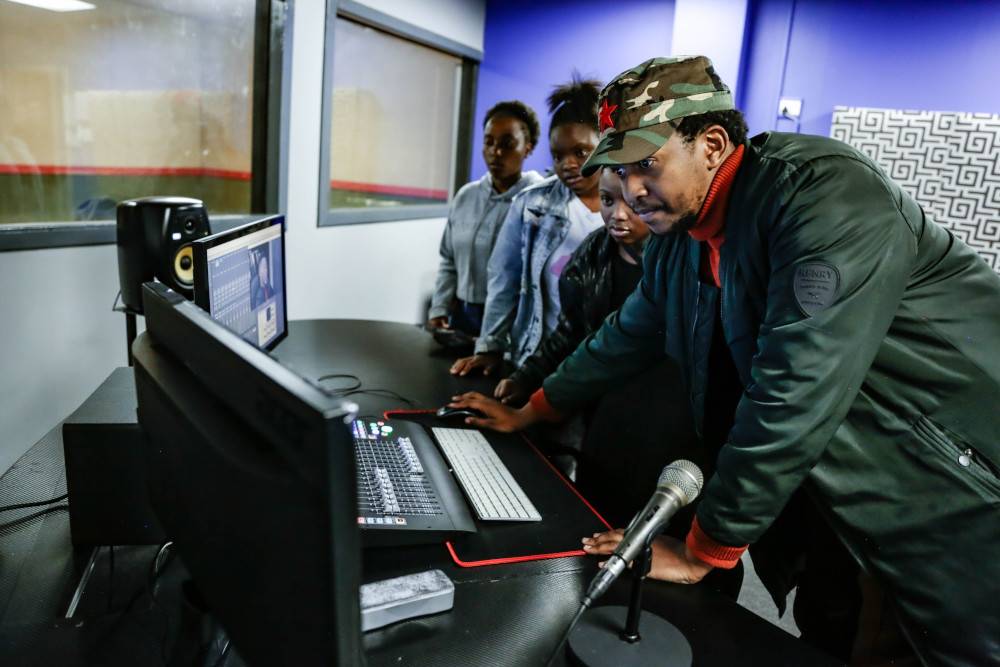
Real-world application of knowledge takes centre stage.
Throughout this all, the practical elements and real-world application of knowledge remain centre stage. “All the theory, networking possibilities and industry engagement is worthless if a student does not engage with it. And they do! The first rule of acting is applicable to all AFDA programmes — learn your lines and be on time!”
Students are encouraged to think like entrepreneurs from day one, and to try their hands at various ventures while still engaged with studies. This mindset is cultivated through coursework in business management, marketing, and finance.
The hands-on approach ensures that by the time students graduate, they are prepared to launch their own business, and many have already done so before donning their caps and gowns. Graduates are more than artists; they are creative business leaders who can navigate the complexities of the industry.
With a commitment to industry relevance, hands-on learning, and fostering an entrepreneurial mindset, AFDA is helping shape the future of South Africa’s creative landscape, where creativity and business meet and flourish: “I know we have already played a major role in shaping and transforming South Africa’s entertainment industry, but I also know our role is far from over. I see our students starting to engage with their audiences right there, right where they are, and this brings a new plurality to the entertainment industry and creative economy. Going forward, I believe this will provide a broader base and a strong growth in this industry, and look forward to playing my part to see that become a reality,” says Smit. — Kofi Zwana